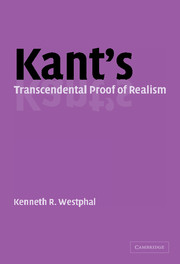Book contents
- Frontmatter
- Contents
- Acknowledgments
- List of abbreviations
- Introduction
- 1 Kant's methods: transcendental and epistemic reflection
- 2 The metaphysics of Kant's transcendental idealism
- 3 Transcendental affinity
- 4 The gap in Kant's Critique of Pure Reason
- 5 Kant's dynamic misconstructions
- 6 Kant's metaphysical proof of the Law of Inertia
- 7 Three Kantian insights
- Appendix
- Bibliography
- Index of names
- Index of subjects
7 - Three Kantian insights
Published online by Cambridge University Press: 06 November 2009
- Frontmatter
- Contents
- Acknowledgments
- List of abbreviations
- Introduction
- 1 Kant's methods: transcendental and epistemic reflection
- 2 The metaphysics of Kant's transcendental idealism
- 3 Transcendental affinity
- 4 The gap in Kant's Critique of Pure Reason
- 5 Kant's dynamic misconstructions
- 6 Kant's metaphysical proof of the Law of Inertia
- 7 Three Kantian insights
- Appendix
- Bibliography
- Index of names
- Index of subjects
Summary
INTRODUCTION
This study has pursued Kant's transcendental analysis of the a priori conditions of self-conscious human experience in great detail, not to find fault but to learn and build upon Kant's genuine insights and achievements. chapter 1 hailed the merits of Kant's “changed method of thinking,” which centrally involves transcendental, or more broadly, epistemic reflection; its central role was noted repeatedly (§§8, 9, 22.2, 23.1, 23.5, 36.3, 56). The invalidity of Kant's arguments for transcendental idealism was demonstrated on the basis of Kant's sound transcendental proof of the conditional necessity that any world in which human beings can be self-conscious is a world that presents us with a minimum necessary degree of identifiable regularity and variety among the contents of our sensations, of appearances to us, or of what we experience. (The same point holds at each of these levels.) In this important regard, the resources of Kant's transcendental method of analysis and proof significantly surpass those of his transcendental idealism. The constructive aim of this chapter is to show that this kind of conditional necessity and the transcendental analyses used to support it have powerful, philosophically very significant implications regarding rational agency, the justification of causal judgments, and perceptual skepticism. Thus this chapter aims to integrate, reinforce, and develop the findings of the previous chapters.
The first step (§61) is to reinforce the importance of the integrity of Kant's three Analogies of Experience (§§2.5, 36) by showing that the Analogies together with Kant's Paralogisms provide an unexpected defense of practical freedom, of freedom of agency within the phenomenal, spatiotemporal realm.
- Type
- Chapter
- Information
- Kant's Transcendental Proof of Realism , pp. 228 - 268Publisher: Cambridge University PressPrint publication year: 2004



